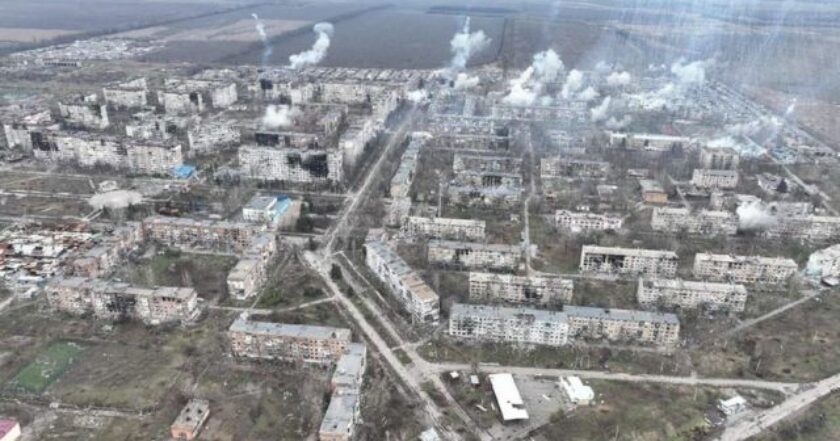Russian forces launch coordinated attacks in Vuhledar and Pokrovsk, aiming to stretch Ukrainian defense in Donetsk region – ISW

Photo: UNIAN
Russian offensive efforts near Vuрledar and Pokrovsk are mutually reinforcing and are likely intended to stretch Ukrainian forces on a broader front in the Donetsk region.
The Institute for the Study of War (ISW) reported that.
"Russian forces have reached the outskirts of Vuhledar amid what appears to be an intensified offensive push near the settlement. Still, the capture of Vuhledar is unlikely to afford Russian forces any particular operational edge for further offensive operations in the western Donetsk region," American experts said.
As analysts emphasize, geolocation video footage published on September 24 shows that Russian troops have advanced into eastern Vuhledar to 12 Desantnykiv Street, confirming reports from Russian and Ukrainian sources that Russian troops broke through to eastern Vuhledar between September 23 and 24.
Russian troops are also trying to advance on the northeastern flank of Vuhledar through Vodiane and the southwestern flank through Prechystivka. They probably intend to surround the Ukrainian group in Vuhledar and force it to retreat.
"Western media and Ukrainian military experts and journalists widely warned on September 23 and 24 that constant Russian assaults and advances on the flanks of Vuhledar are threatening to encircle the Ukrainian garrison within the settlement, which may force Ukrainian troops to withdraw from the area, which has been an important Ukrainian stronghold for over two years," experts emphasized.
Military analysts believe that Russian troops can capture all of Vuhledar, but how quickly and easily they will do so will depend, in particular, on the Ukrainian side's decision-making.
"If the Ukrainian command decides that the risk of a Russian encirclement of Vuhledar or the costs of defending the settlement itself in urban combat are too significant, Ukrainian forces may withdraw, allowing Russian troops to seize Vuhledar relatively rapidly and without engaging in close combat fighting.
However, suppose Ukrainian forces decide to defend Vuhledar and can prevent Russian efforts to envelop or encircle it. Russian forces may struggle to fight through a settlement that the Ukrainian troops have had over two years to fortify," ISW noted.
If the Russians don't act swiftly, experts predict that autumn rains may also hinder their troops' flanking maneuver on Vuhledar. Due to the swampy conditions, the invasion through the predominantly rural surrounding area will become much more complicated.
According to the review, Russia made at least two significant attempts to capture Vuhledar in late 2022 and early 2023. However, these efforts led to significant losses of Russian soldiers and equipment. Meanwhile, Ukrainian forces were able to strengthen their hold on the settlement and closely observe how the Russian group strategizes and conducts attacks in this region.
"Russia's potential seizure of Vuhledar is unlikely to fundamentally alter the course of offensive operations in the western Donetsk region, however.
Vuhledar is not a particularly crucial logistics node—Russian forces already control most of the main roads running into Vuhledar (the T0509 Vuhledar-Prechystivka road, the C050524 Pavlivka-Vuhledar road, and the T0524 Vuhledar-Marinka road) and are likely already credibly threatening the C051134 route into Bohoyavlenka with close range artillery fires, so the capture of the settlement would not immediately offer Russian forces access to a new roadway, nor cut Ukrainian forces off from a roadway that is crucial to their logistical supply.
The analysts emphasized that the potential seizure of Vuhledar will not necessarily afford Russian forces a beneficial position from which to launch subsequent offensive operations elsewhere in the western Donetsk region," the analysts emphasized.
According to ISW's preliminary assessment, the Russian offensive efforts at Vuhledar and Pokrovsk are mutually reinforcing and intended to stretch Ukrainian forces in a broader front in the Donetsk region. However, a hypothetical Russian capture of Vuhledar would not necessarily be operationally necessary enough to stretch Ukrainian forces still further in the area.
ISW key findings as of September 24:
- Recent Ukrainian strikes against Russian rear ammunition depots demonstrate the extent to which Russian military logistics still benefit from Western-provided sanctuary that secures Russia's rear.
- Russia continues to expand and leverage its bilateral relations with the People's Republic of China (PRC) to support its war effort in Ukraine.
- The Russian Ministry of Defense (MoD) has failed to appease the Russian ultranationalist military blogger community by downplaying the Russian army command's responsibility for its insistence on misusing technical specialists in infantry-led frontal assaults in eastern Ukraine.
- Ukrainian forces recently advanced west of the Kursk region salient.
- Ukrainian forces recently advanced within Vovchansk and in eastern Toretsk.
- Russian opposition outlet Meduza, citing its own conversations with various unspecified Russian officials close to the Russian Presidential Administration, an interlocutor in the federal government, and regional officials, reported on September 24 that mobilization is a very sensitive topic among Kremlin officials.
It is worth mentioning that the Russian occupying forces have been destroying Vuhledar in the Donetsk region and are attempting to advance on its surrounding areas. Foreign media reports suggest that the 72nd Brigade, responsible for defending the city, may become encircled.

Ukrainian army counterattacks near Pokrovsk — Forbes

Russian military caught on tape killing surrendered Ukrainian soldiers near Pokrovsk – CNN

Ukrainian forces stop Russian attempt to advance on Vuhledar front – Zelensky



















































